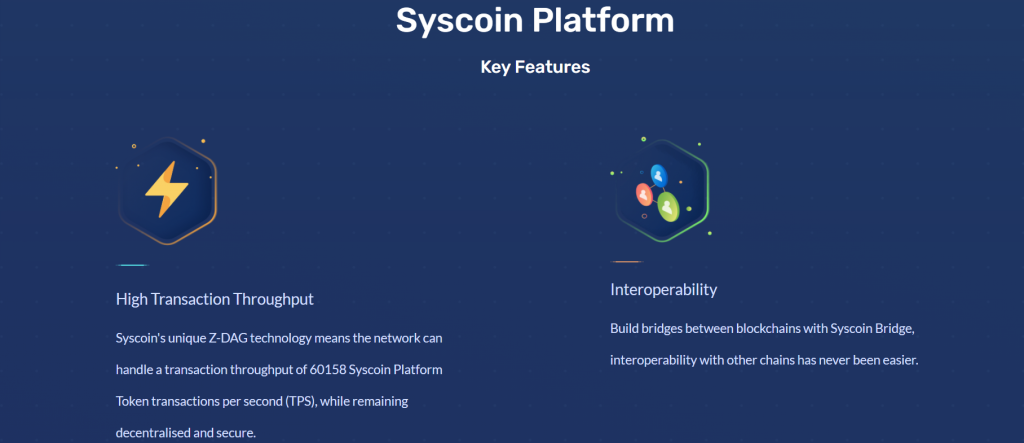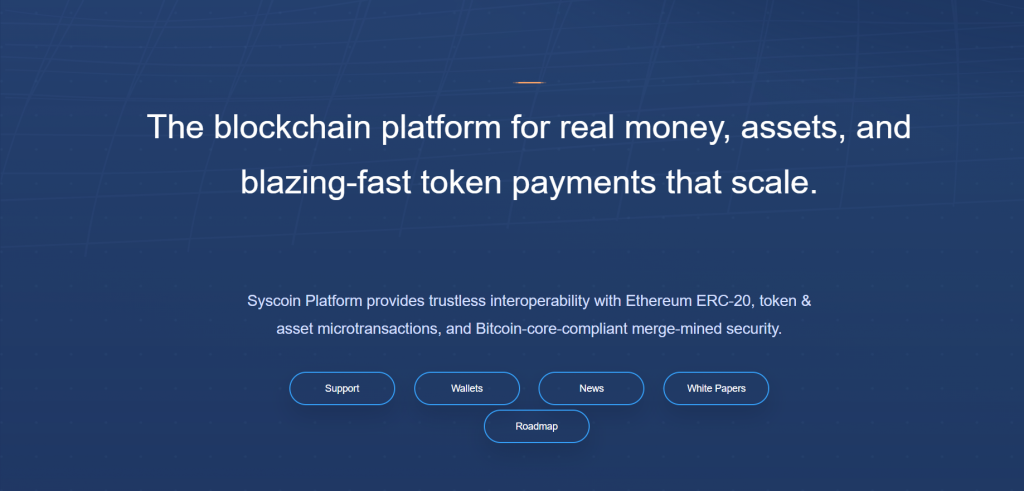Syscoin
(sys)
Not AvailablePrices are in USD.
Market Data For syscoin
| Current Price | $0.18 |
| Market Cap | $152,388,544 |
| Market Cap Rank | #348 |
| Total Volume | $2,314,744 |
| High 24H | $0.20 |
| Low 24H | $0.18 |
| Price Change 24H | 0.01% |
| Price Change Percentage 24H | 6.61% |
| Market Cap Change 24H | $9,288,510.00 |
| Market Cap Change Percentage 24H | 6.49% |
| Circulating Supply | 775,298,688 sys |
| Total Supply | 783,921,792 |
| All Time High |
$1.30
-84.89%
January 2, 2022 |
| All Time Low |
$0.0002
February 22, 2015 - |
Coin Data For syscoin
About syscoin
Syscoin Review: Mining Guide, Price & Analysis of Syscoin Cryptocurrency
Syscoin is an open-source blockchain development platform and cryptocurrency. Additionally, The platform is a global network and a distributed ledger. This a multifaceted blockchain. It allows you to transact quickly and securely to anyone and anywhere.
Additionally, it lets you create your own Syscoin Platform Tokens. Users can then transact your coins in a fast and secure manner. Further, the platform creates a permissionless two-way bridge. This bridge makes it possible to tap into Ethereum smart contracts and infrastructure.
The functionalities of this blockchain are numerous. The platform attempts to remove big corporation middlemen like Amazon and eBay from transactions. In turn, merchants and consumers gain full control of their money. The freedom realized from this has vast social and economic incentives.

Syscoin is an indication of the future of marketplaces. It offers a practical solution that is very close to the original vision of Bitcoin. In fact, it is a Bitcoin fork. Therefore, it follows a lot of standards that align with Bitcoin’s standards.
How Syscoin Works
The platform creates a blockchain bridge for Syscoin and other blockchains. This bridge allows Syscoin tokens to exist across other blockchains. It is a two-way peg that is a focal point of the entire industry.
The vision for this bridge is to support all other blockchains. However, the first direct bridge is for Ethereum for smart contract execution. Participants can use the bridge to leverage any blockchain’s Turing.
Further, It utilizes Z-DAG. Z-DAG stands for Zero Confirmation Directed Acyclic Graph. The platform uses Z-DAG as a complementary system to proof of work. It applies these two algorithms in the confirmation of transactions. Moreover, the platform uses Z-DAG for validating nodes across the network. This helps keep the network in absolute consensus.
This makes it extremely fast and secure. This is because participants in a transaction agree upon settlements really fast. This happens without the block confirmation. This is because the network can anticipate transactions for the next block. This is a revolutionary development.
Can Investors Mine Syscoin Coins?
The platform gives Syscoin tokens a range of use cases. The coins are usable in transaction payments within the Syscoin ecosystem. More adoption of this ecosystem would make Syscoin coins gain in value.
Due to this, investors want to obtain some of the coins for themselves. Luckily, it is possible to mine Syscoin coins. The platform has an algorithm that allows merge-mining with Bitcoin. Merge mining is the ability of miners to simultaneously mine two different coins based on the same algorithm.
Just like Bitcoin, it uses Proof of Work consensus. Moreover, the platform's uses a SHA-256 encryption algorithm. Further, it has a block time of 1 minute. The block sizes are small, with a target of 10 MB blocks.
The platform supports both CPU and GPU mining. However, the Syscoin team does not advise CPU mining. This is because the hash is too high.
Miners can choose to mine alone or join a mining pool. Solo mining is no longer profitable in many blockchains. Therefore, it is more advisable to join a mining pool. An example of a mining pool that supports its mining is mining-dutch.nl.
The max supply of Syscoin coins is 888,000,000. This is not extremely high. Therefore, it shows that the platform has the potential to gain in value over time. When supply is low, cryptocurrencies usually see a surge in prices. However, for that to happen, Syscoin first needs to see adoption.
The Team behind Syscoin
Syscoin has a formidable team spearheading it. Jag Sidhu is the Foundation President and Lead Core Developer of Syscoin. He is an expert of blockchain technology. Additionally, Jag specializes in machine learning and artificial intelligence. Moreover, he is a 20-year veteran in software development.
Alongside Jag is Michiel, the Vice president. Michiel is a cryptocurrency enthusiast since 2013. Syscoin is one of his first investments. He is a marketing expert with success both online and offline.
Other team members include Reiner, Willy Ko, Brad Hammerston and more. All these individuals have extensive experience in various areas. As such, Syscoin is in safe hands. These are professionals who know what they are doing.
Privacy and Security
Syscoin has excellent security features. The network goes through rigorous security auditing to ensure everything is working well. Moreover, miners play a critical role in keeping the network secure the blockchain. They do this by validating transactions.
The decentralized nature of this blockchain is also a security feature. Nodes in the network help each other recover from attacks. Therefore, it is impossible to attack multiple nodes at the same time. This is computationally expensive. It is better to mine for rewards.
Transactions on the Syscoin blockchain are fully transparent. The ledger is open to the public for viewing and maintaining. However, transactions are immutable once recorded.
Governance
Syscoin has its own governance portal. This portal provides the base for a decentralized governance system. This currently an open-source community project. Users can create and keep track of proposals for changes for the Syscoin ecosystem.
This portal has a lot of functionalities. Some of these functionalities include:
- The ability to make a proposal to the governance system for a fee of 100 Syscin coins.
- Keeping track of current and past proposals.
- Masternode holders are able to vote for proposals. They do this through the portals trustless capabilities.
- The portal also allows for Chat and discussions.
Our Take on Syscoin
Syscoin is an exciting blockchain. It is an indication of where the blockchain technology is heading. This blockchain allows for interoperability between blockchains. It provides a token bridge to facilitate communication across blockchains.
With technology like this, it easy for businesses to collaborate on the blockchain. This is a compelling reason for companies to onboard the blockchain technology. The ability to collaborate in a decentralized environment has many economic benefits. This means that Syscoin might see more adoption in the future.
However, Syscoin does face a lot of competition from other blockchains that are more versatile. Syscoin only provides interoperability with Ethereum ERC-20 tokens. Other solutions support many more cryptocurrencies. Therefore, many people would adopt these solutions instead of Syscoin.
Advantages
- Syscoin allows for interoperability.
- Syscoin is very fast and secure.
- Transparency.
- Decentralized governance.
- High scalability.
Disadvantages
- Stiff competition from more versatile alternatives.
- Not easy to mine.
How to Buy Syscoin Coins
Buying is the easiest way to obtain cryptocurrencies. Luckily, there are several exchanges that support the exchange of its coins. These include Poloniex, Binance, Sistemkoin, Upbit and CoinEx.
The price of Syscoin at the time of writing this is $0.072051. Additionally, it has a 24-hour trading volume of $1,409,598. The market cap share for this coin is $43,356,262. This places Syscoin at rank 171 in market cap share.

We cannot underestimate the value of this coin. The value of blockchains that support interoperability is going up. In turn, the value of their native coins is going up.
Final Verdict
The blockchain space is evolving. We are now seeing the next generation of blockchains. An example of such blockchains is Syscoin. It supports interoperability and offers numerous benefits. It is easy to see the use case for this kind of blockchain.
However, its adoption may not be straightforward. This is because it is facing very stiff competition. Some of the competitors have better funding and support.
 $97,172.00
$97,172.00
 $3,109.04
$3,109.04
 $1,528.07
$1,528.07
 $2,389.10
$2,389.10
 $609.61
$609.61
 $516.49
$516.49
 $294.43
$294.43
 $161.98
$161.98
 $88.85
$88.85
 $157.97
$157.97
 $86.66
$86.66
 $74.47
$74.47
 $76.21
$76.21
